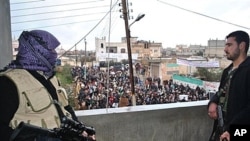U.S. Secretary of State Hillary Clinton said Monday the United Nations must act to end what she calls the Syrian government's "violent and brutal attacks on its own people." Russia opposes U.N. action and says the government in Damascus has agreed to talks in Moscow.
In a written statement, Clinton said the U.N. Security Council must “make clear to the Syrian regime that the world community views its actions as a threat to peace and security.”
Clinton heads to the United Nations on Tuesday to back an Arab League resolution against President Bashar al-Assad because, she said, the longer his government “stands in the way of a peaceful transition, the greater the concern that instability will escalate and spill over throughout the region.”
State Department Spokeswoman Victoria Nuland said Secretary Clinton is going to the United Nations for what she said will be “a very strong opening conversation” on the Syria resolution, where she will be joined by her French and British counterparts.
"She is going to send a very clear message that we support the Syrian people. We stand with you. We stand with you in your hope and aspiration for a better, more democratic future. And first and foremost that the violence is going to end,” said Nuland.
Syrian opposition activists say government troops have retaken control of several Damascus suburbs in heavy fighting with rebels engaged in a 10-month long uprising against President Assad.
Nuland said the withdrawal of Arab League monitors - who the government prevented from fully carrying out their mandate - has opened the way for more killing.
"We are gravely concerned that as these Arab League monitors have pulled out, [and] the Syrian regime has taken this as an excuse to just let loose in horrific ways against innocents,” said Nuland.
Russia and China oppose U.N. action on Syria, with Russia calling for national dialogue to end the political crisis. Russia's foreign ministry on Monday said Damascus has agreed to send a delegation to Moscow for talks with opposition activists.
A foreign ministry statement says Russia hopes that opposition representatives also will agree to attend. Senior members of the opposition Syrian National Council reject the idea.
Analyst Marou Innocent of the Washington-based Cato Institute research group said Russia's call for talks in Moscow is meant to weaken momentum for U.N. action.
“This is sort of a way for Russia to have a stake in the game, but also sort of hedge against a lot of the criticism and backlash it has been having from the West,” said Innocent.
Middle East expert Steve Heydemann of the United States Institute of Peace said there is deep concern in Moscow that the fall of the Damascus government would weaken Russia's standing in the region.
“If the regime were to change and Syria were to move in a more pro-Western direction, I think the Russians would view that as a blow to their strategic posture in the region. And so one of the things that the U.S. might do is offer reassurances to the Russians that even if a process of regime transition happens in Syria, they won't be left out,” said Heydemann.
Asked about Russia's plans for Syrian talks in Moscow, State Department Spokeswoman Nuland said the first priority must be an end to fighting.
"Again, there have been plenty of talks outside Syria over the last few months. It is very difficult to see how you address the real dangers and the real concerns unless and until the violence comes to an end,” said Nuland.
Facing the threat of a Russian veto over U.N. action on Syria, a senior U.S. diplomat said it is time for the Russians to decide whether “they are going to continue to give cover to this kind of action,” which the United Nations estimates has killed more than 5,000 people.
| Join the conversation on our social journalism site - Middle East Voices. Follow our Middle East reports on Twitter and discuss them on our Facebook page. |




